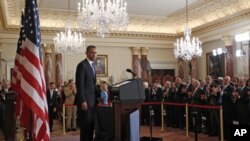Middle East analysts say U.S. President Barack Obama's speech on the uprisings in the Middle East and North Africa was effective in aligning American policy with the sweeping changes in the region. However, they also say his remarks on the Israeli-Palestinian conflict could prove to be a major distraction from his overall message.
As Arab protests continue to sweep across the Middle East, analysts say the primary goals of President Obama's speech were to call for political and economic changes, while standing behind the peaceful protestors and against violence.
Referring to the uprisings in Egypt and Tunisia, Obama noted that so far this year two leaders have stepped down in the region and said more may follow as demonstrators demand their basic rights.
"The Arab Spring, as we call it, is changing the region and he wants to make sure that people in the region know and that the American people know, that the United States supports the changes that are occurring in the region," said Graeme Bannerman, a scholar at the Middle East Institute.
Obama announced financial incentives to support modernization and stability in Egypt and Tunisia. That brought a positive reaction from Dalya in Cairo. "He understands what we are going through," said Dalya. "He is trying to do his best."
President Obama says the people of Syria have shown their courage in peacefully demanding a transition to democracy, while the government in Damascus is brutally cracking down on the protestors.
Obama bluntly said Syrian President Bashar al-Assad now faces a choice to either lead that transition "or get out of the way."
"But if they can continue to protest, then I think the clock is inexorably ticking to the point where U.S. policy will be - it is time for you to go - Mr. Assad," said Robert Satloff, executive director of the Washington Institute.
Perhaps drawing the most attention were Obama's remarks on the Israeli-Palestinian conflict, as Arab protests have come to the borders of the Jewish state.
For the first time a U.S. president said publicly the borders of Israel and a future state of Palestine should be based on lines that existed before the 1967 Middle East war, with mutually agreed land swaps with the Palestinians. Such a move could leave Jewish settlements in the West Bank outside of Israel.
Israelis and Palestinians reacted to the speech Friday in Jerusalem.
CHAIM: "Ignore Mr. Obama. Simple, we are an independent, sovereign state."
HAJIR: "What happened to us before Obama and what has happened to us since Obama, nothing has changed. Actually things are going backward."
President Obama also called for the full withdrawal of Israeli military forces from the West Bank. Analysts say being so specific about sensitive issues in the Israeli-Palestinian peace process could draw attention away from his overall message of supporting peaceful change.
"I do think the president injected the seeds of a major distraction from that by delving in as detailed and provocative way as he did in the Israeli-Palestinian conflict," said Analyst Robert Satloff.
As the Arab uprisings continue to transform the region, analysts say President Obama's strategy will likely evolve over time. They add that the U.S. and other countries will have to adapt their policies to reflect the changes continuing to roil the Middle East.
Middle East Analysts Praise, Express Concern about Obama Speech




